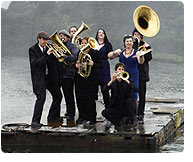|
|
 |
 Sousaphones, Super Fly, and 7/8: Brass Menažeri’s Bumping Brass Party Grooves from Bosnia to Bollywood
Sousaphones, Super Fly, and 7/8: Brass Menažeri’s Bumping Brass Party Grooves from Bosnia to Bollywood
Bosnian gems mingle with Bollywood bangles, while Rromani (Gypsy) hits mix with super-fly funk. Thanks to dreamed melodies and down-and-dirty bass lines, Brass Menažeri has been packing Mission bars with a heady mix of Balkan perfection and Bay Area eccentricity, of serious chops and serious joy, for years.
Now on Vranjski San (Porto Franco Records; August 17, 2010)¸ the brass band with attitude breaks out a fresh vision of how hip Balkan brass can be, while maintaining a rare depth of cultural knowledge. The group puts a new polish on favorite songs from Rromani, Greek, and Slavic masters, while shining light on unexpected sides of Balkan culture: the love of Bollywood, the funky production esthetics, the constant hunger for new sounds to try in old forms.
“We like to lay it down,” smiles Peter Jaques, Brass Menažeri director, clarinetist, and horn player. “We bring in elements of rock and funk, but subsume them into the tradition, something parallel to what’s going on in places like Serbia. They aren’t sticking to the sounds of the 1960s. They bring in whatever they hear as new color for their palettes.”
Witness “Opa Cupa Fly,” a funkified take on a classic by the popular Rromani singer and accordionist Šaban Bajramović. After years of playing their brass band arrangement of the song—and starting a minor “Opa Cupa” craze among belly dancers—the band was seriously sick of their big hit. So they reimagined the track, throwing in a heavy Earth, Wind, and Fire-style backbeat and inviting friends from the Afrobeat group Aphrodesia to leap in. The result was “a funk remix of the song, with a nod to Super Fly,” Jaques explains.
Or “Lal Lal Hothon Pe,” a Bollywood number big in the 1990s that somehow lent itself perfectly to Balkan-style brass band, hinting at long-lost ties between the Rroma and their subcontinental kindred. Or “Hassan’s Dream,” a tune by jazz saxophonist Benny Golson that in Brass Menažeri’s hands suddenly intertwines with new modes and scales to become utterly Ottoman.
Yet all this quirky creativity and unbridled innovation rests on a firm foundation of cultural knowledge and strong musicianship that speaks of decades playing and partying to Balkan music.
Jaques, who got into Balkan brass through what he humorously calls “the gateway drug of klezmer,” was mesmerized early on by the complex time signatures characteristic of even the most straightforward Balkan dance music. Fascination led to several stints at a California Balkan music camp and finally to a community band of sorts, made up of fellow fans from camp.
To this strong base, Jaques and his bandmates have added deep musical and cultural knowledge gleaned on extensive trips around the former Yugoslavia, exploring brass festivals, and finding and composing new tunes. The traditions have sunk into Jaques’s bones—and even disturbed his sleep.
One night in the Serbia town of Vranje, after a day at a small brass festival, “I woke up in the middle of the night and I had this melody in head. I wrote it down by flashlight in my music book,” Jaques recalls. “I played through it the next day and was surprised; I didn’t have to change the melody at all.” That melody became “Vranjski San (Vranje’s Dream).”
Like the melody, Brass Menažeri’s big break came from an unexpected quarter: an invitation to play a small bar in San Francisco’s Mission thanks to an unexpectedly enthusiastic booker. They packed the place, and have been filling dance floors with delicious songs in 7/8, fat sousaphone bass lines, and high-speed horn antics ever since.
While many groups in the Bay Area focus on precise recreation of traditional sounds, Brass Menažeri insists on a new twist, even for their straight-ahead Balkan numbers. They often take a song that was originally Bosnian, and give it a Serbian or Macedonian treatment, reflecting the creative process once common in Yugoslavian music, now fraught with bitterness. Jaques muses, “In some tiny way, this is about peacemaking.”
To understand the subtleties, it helps to understand the peculiar lives of songs in the former Yugoslavia. Songs can be dividing lines between people, even for those who share and love another ethnic group’s songs in private. Jaques experienced this situation firsthand while camping with a friend and his father at one of the biggest brass festivals in the Balkans. Jaques had his horn, and his friend’s father kept urging him to play something. Next to them stood a grim group of very unfriendly Serbian nationalists.
“I played what I thought was everybody’s song. I’d heard Serbian bands play it, but it’s a Bosnian-sounding song. The Rroma like it, too. I even heard him singing it just the day before,” Jaques recounts. “He pretended he didn’t know it. He wouldn’t sing along and was stonewalling. I left really frustrated, and my friend said, ‘Sorry, that was a Bosnian song.’ That’s one of the reasons I got into approaching this music as if those boundaries weren’t there—or crossing them.”
The boundaries melt away in Brass Menažeri’s pumping bass and nimble solos, capturing the ethos of the open-minded Bay Area and its Eastern European émigré community that relishes the band’s shows. “We have pan-Balkan fans, and they all hang out together. I don’t know how much credit to take for that,” Jaques laughs. “People who were at war come hear us and realize that they have everything in common, that Serbian versus Bosnian versus Albanian doesn’t matter too much. They all speak the same language and share same tastes. And everybody loves to dance.”
<< release: 08/17/10 >>
|
|
 |
|
|
|